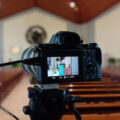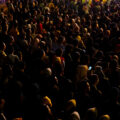A digital revolution in religion
A digital revolution in religion
Religious communities have increasingly gone digital during the pandemic. Is virtual religion here to stay?
Back in 2020, EARS hosted three virtual round table meetings to discuss the digitalisation of religion. At the time, the COVID-19 pandemic had just hit Europe and faith communities were adapting themselves to online practices.[1] Over two years later, it is time to assess the impact of digital religion.
Virtual religion
In July 2022, EARS published a dossier on the social impact of COVID-19. Virtual religion emerged as a key theme. Religious services and rituals underwent a digital revolution in all countries covered. Traditions such as Easter[2] [3] and Ramadan[4] [5] have been celebrated online, and other activities have been transformed as well.
For example, the Lourdes caves in France have organised virtual pilgrimages. Believers could join in prayers in a digital way – from wherever they were located.[6] In the UK, during a month of lockdown, 10,000 people installed the ‘Time to Pray’ app.[7] Priests from the Ethiopian Orthodox Church in Sweden organised a system for members to be called and to call each other, to ensure they were supported throughout the pandemic.[8]
This surge in virtual religion underlines the strong need for religious communities – even if digital. In fact, several religious leaders have expressed their joy over ‘going digital’, as they hoped it would have a long-term benefit for reaching a younger audience.[9]
Online dating
Such a need for connection is also reflected by religious individuals taking to digital means to find love. For example, over 130,000 people in Finland are using the Christian dating app Valo (‘Light’), which was launched when dating became difficult due to COVID-19 restrictions.[10] An earlier EARS article also outlines how faithful in the UK make use of Christian dating websites to find a partner.[11]
Muzmatch, a dating app for Muslims, even went viral in early 2022, after the picture of 29-year-old Muslim financial consultant Muhammad Malik appeared on London and Birmingham billboards advertising the app. Malik received 5,000 responses to his search. However, the app’s campaign was defined as unethical by some, since they believed the app to be leaning into Islamophobia with the slogan ‘save me from an arranged marriage’. Yet, others praised it for its viral success.[12]
A place of harm
Despite its many benefits and positive features, the digitalisation of religion also poses threats. Social media seem to increasingly offer a platform for harm. For example, research revealed that antisemitic conspiracy theories gained popularity during the pandemic. In the Netherlands, 200,000 antisemitic messages were spread via social media in 2020. According to the Dutch National Coordinator for Combating Antisemitism, online antisemitism is still too often without consequences. The approach to counter antisemitism is mainly focused on violations in the physical space.[13]
In addition, social networks can accelerate the spread of disinformation. At an event of the Episcopal Commission for Social Communications (CECS) in May 2022, the Bishop of Cartagena, Spain, stated that it is getting more difficult for people to know the truth. Similarly, the CECS’s president claimed that social media can be used as a “powerful tool of disinformation.”[14]
Finally, online religion has also led to mental health issues for faithful now isolated in their homes. To illustrate, over 70% of youth workers in the Evangelical-Lutheran Church in Finland estimate the pandemic has increased mental health challenges, including anxiety, depression, hopelessness, loneliness, and exclusion, among youths.[15]
Beyond COVID-19
As we have seen, the pandemic has fostered many digital initiatives in religion. But even when the pandemic ends, it is not expected that religious groups will abandon the discovered digital possibilities.[16] Nevertheless, they must also find ways to deal with the threats of digitalisation, such as discrimination, disinformation, and mental health challenges.
Sources
[1] Whitepaper: Digital Religion During COVID-19
[2] Holy Week: Easter services to be broadcast on TV, radio and online | News | ERR
[3] Irish churches embrace technology during pandemic
[4] Un Ramadan diverso – Il Post
[5] Ramadan tijdens corona: bidden via Zoom, eten in Hangouts – NRC
[6] Deuxième édition du pèlerinage virtuel « Lourdes United »
[7] Pandemic prompts surge in interest in prayer, Google data show
[9] Trolig første gang på over 1000 år det ikke er vanlige påskegudstjenester
[10] Jo yli 100 000 suomalaista käyttää kristillistä deittisovellusta, ja pian se kasvaa ulkomaille – mikä on Valo ja miten se eroaa kilpailijoista?
[11] Swipe right for a wife: The curious phenomenon of Christian dating websites
[12] How a Muslim dating app made UK man’s search for a wife go viral
[13] Antisemitismebestrijder: online Jodenhaat nog te vaak onbestraft
[14] Los obispos denuncian que algunas redes sociales son “herramientas poderosas de desinformación”
[15] 10-vuotias lapsi on pitänyt etäisyyttä muihin jo viidesosan elämästään – nuorten ongelmien lisääntyminen näkyy kirkon kasvatustyössä






